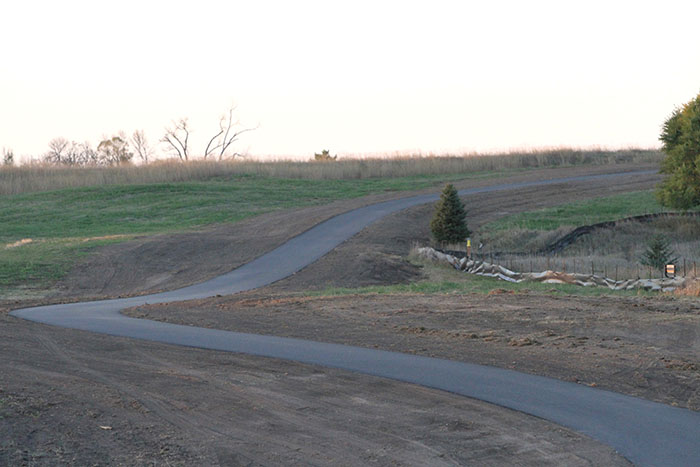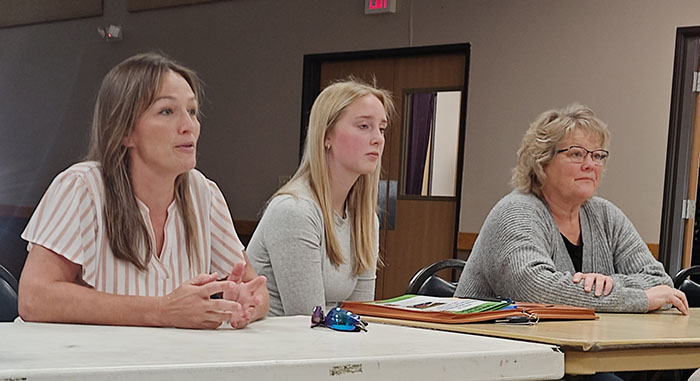Frazee considers donation to Pickleball efforts
News | Published on October 14, 2025 at 4:29pm EDT | Author: frazeevergas
0Water user fee ordinance intention still in question

Visitors to Wannigan Regional Park can now enjoy walking or biking along 2.1 miles of paved trail inside the park. The council signed a grant agreement with the state that will bring restrooms, a shower house, a roundabout, and camping facilities next year.
By Robert Williams
Editor
Members of the Frazee Pickleball committee, led by Youth Chair Madison Olson, made a pitch for assistance in funding the planned four courts.

Members of the Frazee Pickleball Finance Committee Rachael Johnson, Madison Olson and Shelly Blauert proposed the project to the City Council Wednesday, Oct. 8. The council is awaiting a recommendation from the finance committee during its budget planning time for a future donation to the project.
Olson described how she and her friends and many pickleball players visit the courts in other towns and while there they are also putting their money to work in those communities.
“Not only would having pickleball here in Frazee benefit those who like to play, but also benefit economic growth,” Olson said.
The committee consists of multiple partners, the Frazee-Vergas School District, the Frazee Area Community Club (fiscal host) and Creative Community Consulting (CCC).
Olson also provided a list of surrounding towns that have pickleball courts, even surprising meeting attendants with the announcement that Wolf Lake even has a court. It is only one court at the town campground, but it is a pickleball presence in the smaller city.
Olson is seeking support for a capital campaign to raise $282,000 over the next three years.
The location of the future pickleball courts in Frazee, near the new ballpark by the elementary school, are geared to benefit significantly from both the steady stream of visitors to nearby Wannigan Regional Park and the presence of the local school population, according to Olson.
Olson and Mayor Mike Sharp had a conversation on the popularity of the sport and the potential traffic it brings to an area.
“I think the great part about it is it is for every generation; I’ve played with my mom and my younger sister,” Olson said.
Currently $66,000 has been raised for the project in just a few months. The next fundraising goal is $80,000 on top of those funds.
“From my perspective, I think there is a way to help out with this and it should be a priority,” Sharp said. “As a city, there is no way we can construct a pickleball court on our own. That’s just not going to be in our finances in the foreseeable future. If we were to help out with this effort I think we can make it a reality.”
“They have basically done all the footwork for us,” said Council member Mark Kemper. “I would like to see the city put something forward. How much we can—that’s always a challenge.”
Council member Andrea Froeber suggested a three-year pledge from the city like was done for CornerStone Community and Family Resource Center.
CCC Consultant Rachael Johnson took a question from Sharp on what would be preferred, a lump sum donation or a pledge over a number of years.
“From a grant point of view, the more cash we have in the bank that we have to match any in-kind funds the better, it opens the door for us to apply for bigger and larger grants,” she said.
Another immediate goal is to get the cement poured this year.
Dirt work on the project has been completed, as are engineering and design, including those fees. The $80,000 sum is needed to finish the concrete work before winter arrives.
Council member Jim Rader suggested a small donation until the board can figure out a larger or complete.
However, Sharp suggested sending the idea to the finance committee to determine what the city is able to donate to the project.
Rader, who is on the finance committee, had some sobering words, albeit apologetically.
“I 100 percent support this and I don’t want to seem like I’m standing in the way because that’s the last thing I want to do, but when I looked at our finance meeting last night we were looking at an $86,000 increase in the tax levy in this community,” said Rader. “Which is a 16 percent increase, doubling the taxes on our local residents in five years if we continue down that road. We’re looking to see what we can cut and if I look at the departments heads and I tell them, ‘You guys have to cut five-grand or cut 10-grand so that we can find a way to keep the taxes down for our residents it’s hard for me to come up with additional funds, as much as I’d like to.”
The pickleball committee members were appreciative of Rader’s work on behalf of the taxpayers.
Sharp, Froeber and Kemper are planning to meet this Thursday, Oct. 16, at 4 p.m. to discuss further.
Recycling
County Commissioner Phil Hansen reported on the county landfills’ recent free e-waste recycling program. The past two years the landfill had received approximately 100 screens or computers etc. each session. This year, 1,200 were brought for recycling.
“It was a success for our county residents,” he said.
Plans are for more free recycling days in the future, like tires, or mattresses.
Rescue
The following have donated to the Frazee Rescue Department: Denise Geritz $350, Robert and Rebecca Muhs $25 LTLC Inc. $250, James and Valerie Kjelstrup $50
Utilities
Conversations continued about utility base rates, regarding water service fees that were challenged by Dale Fett and Tom Watson. Both men own warehouses near Walnut Ave., that do not use water service, yet are connected at the curb stop. The city wants to charge each $600 per year for water service.
The two men claimed they would dig up their properties and disconnect at the curb stop and thus would not pay the fee.
Fett had claimed a situation like his in Detroit Lakes would not draw any charges. That assertion was refuted by City Administrator Stephanie Poegel after speaking with a DL city employee about the situation.
“Detroit Lakes charges sewer base rates if there is a sewer line connected to the main regardless of usage along with a streetlight and stormwater fees,” Poegle said. “If a property owner chooses to dig up and disconnect lines there is a $1,500 minimum fee. All buildings are charged something.”
DL base rates are figured by the size of the meter and the sewer base rates are based on if a resident is connected or not to city water.
Perham does not charge base or usage rates unless the curb stop is on.
The city has told those questioning the fee they will have to cut and cap the line at the curb stop.
City officials have stated their reasoning for charging customers even though they choose not to use water at their buildings is consistency in billing and fairness.
“We can’t have six different layers of how we bill something; we have to be consistent so that it’s fair,” said Froeber.
A potential lack of a meter at the curb stops has created a new problem.
“I feel it’s a little unfair that they’re not using any of the facility part of it but we’re still charging them for using the facility part of it,” said Kemper.
“With no meter, I totally understand that,” said Froeber.
Sharp reported that Perham requires buildings to be connected; Detroit Lakes requires any building that requires potable water to be connected, and cities located in the Twin Cities metro that mandate buildings used for human occupancy need to be connected.
“There are a bunch of different combinations on how different cities handle these things,” said Sharp.
Both Fett’s and Watson’s buildings are plain warehouses with no water usage.
“These guys bought buildings where the water was hooked up; they didn’t have a choice,” said Kemper.
“I would just like to avoid 15 different scenarios; I agree it’s hard to charge for water if there is no meter but I also want to avoid the chaos of okay now we have this scenario and this scenario,” said Froeber.
Sharp wants to go back and examine the ordinance to determine its exact intent, including the user fee for the water treatment plant.
The city is also contemplating a “look back” period of six years for those who had a curb stop but have not been charged.
“I don’t want to exempt people from the ordinance without amending our ordinance,” Sharp said. “If we’re open; if that’s the direction that council would want to go then we need to change our ordinance and provide that exemption and that way it is clear to staff because they need clear direction.”
The council ultimately passed a resolution to amend the ordinance for connection to the municipal water system.
Wannigan Park
The council approved signing a grant contract with the State of Minnesota to fund construction in 2026 of restrooms, a shower house, a roundabout, and camping facilities at Wannigan Regional Park. The total obligation of the State under the grant is not to exceed $917,177.
The paving of the 2.1 miles of trail inside the park was completed last week.

